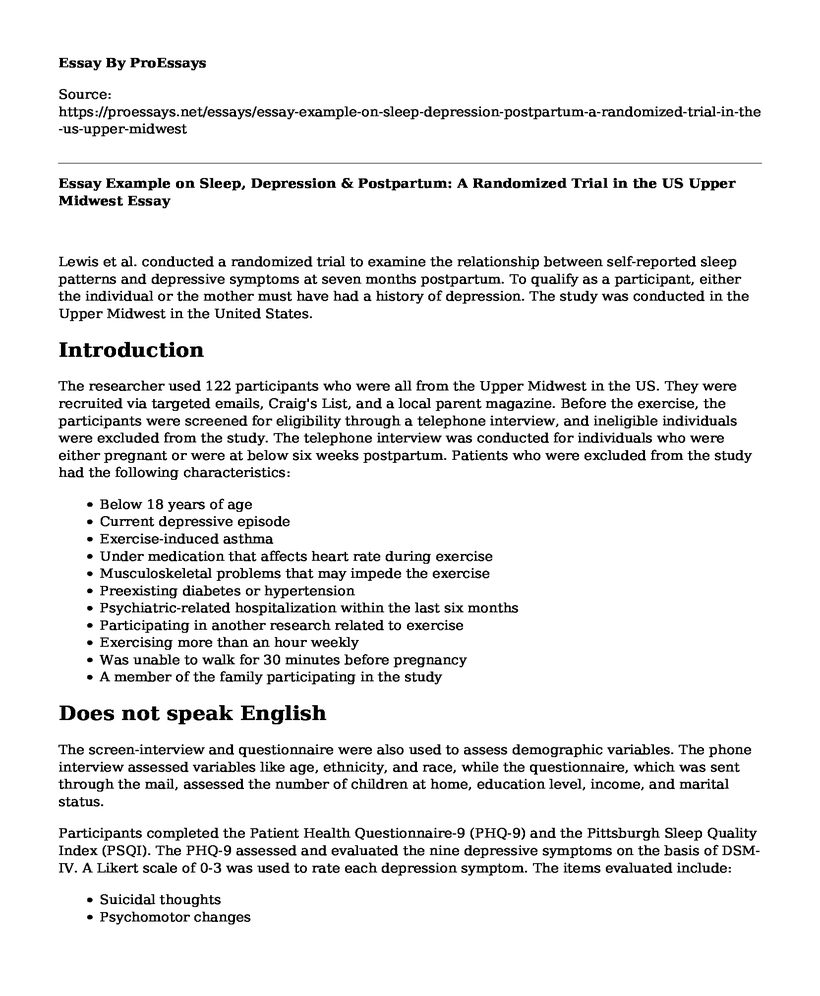Lewis et al. conducted a randomized trial to examine the relationship between self-reported sleep patterns and depressive symptoms at seven months postpartum. To qualify as a participant, either the individual or the mother must have had a history of depression. The study was conducted in the Upper Midwest in the United States.
Introduction
The researcher used 122 participants who were all from the Upper Midwest in the US. They were recruited via targeted emails, Craig's List, and a local parent magazine. Before the exercise, the participants were screened for eligibility through a telephone interview, and ineligible individuals were excluded from the study. The telephone interview was conducted for individuals who were either pregnant or were at below six weeks postpartum. Patients who were excluded from the study had the following characteristics:
- Below 18 years of age
- Current depressive episode
- Exercise-induced asthma
- Under medication that affects heart rate during exercise
- Musculoskeletal problems that may impede the exercise
- Preexisting diabetes or hypertension
- Psychiatric-related hospitalization within the last six months
- Participating in another research related to exercise
- Exercising more than an hour weekly
- Was unable to walk for 30 minutes before pregnancy
- A member of the family participating in the study
Does not speak English
The screen-interview and questionnaire were also used to assess demographic variables. The phone interview assessed variables like age, ethnicity, and race, while the questionnaire, which was sent through the mail, assessed the number of children at home, education level, income, and marital status.
Participants completed the Patient Health Questionnaire-9 (PHQ-9) and the Pittsburgh Sleep Quality Index (PSQI). The PHQ-9 assessed and evaluated the nine depressive symptoms on the basis of DSM-IV. A Likert scale of 0-3 was used to rate each depression symptom. The items evaluated include:
- Suicidal thoughts
- Psychomotor changes
- Concentration difficulty
- Self-deprecation
- Changes in appetite
- Low energy
- Insomnia
- Mood swings
- Diminished pleasure
PHQ-9 has a specificity of 88-98% and a sensitivity of 73-78% for recognizing and classifying disorders bordering on depression. Therefore, experts recommend it for depression diagnosis, subthreshold depressive disorder identification, and evaluation of depression results.
The researchers used the PSQI tool to assess the quality of sleep between an interval of one month for the entire period of the research. PSQI has a scale with seven components, including:
- Use of sleep medication
- Habitual sleep efficiency
- Sleep latency
- Sleep disturbances
- Sleep duration
Subjective sleep qualityThe scale has been proven to have good validity, test-retest reliability, and internal consistency. In one of the studies where the tool was used, it was found to have 86.5% specificity and 89.9% sensitivity. The researchers randomly assigned participants to a six-month wellness control condition or exercise intervention, which was both telephone-based. The two study conditions on depression did not show significant differences at seven months postpartum. Each group had 8% of the participants meeting the diagnostic criteria for depression.
The researchers used linear regression and SPSS statistical package to analyze the data collected. The PHQ-9 scores were 5.98 and 4.17 at six weeks and seven months, respectively. There was a significant decrease in the PHQI between six weeks and nine months. Linear regression analyses revealed that as the PSQ-9 index rose steadily between six weeks and seven months, higher depressive symptoms were recorded in the seventh month. The researcher controlled for depressive symptoms for six weeks before arriving at the results.
The study concluded that there is an improvement in sleep problems during the postpartum phase. Even so, in situations where sleep symptoms become worse or do not improve, postpartum women at high risks of postpartum depression increase risks for symptoms of depression later in the postpartum.
Cite this page
Essay Example on Sleep, Depression & Postpartum: A Randomized Trial in the US Upper Midwest. (2023, Feb 27). Retrieved from https://proessays.net/essays/essay-example-on-sleep-depression-postpartum-a-randomized-trial-in-the-us-upper-midwest
If you are the original author of this essay and no longer wish to have it published on the ProEssays website, please click below to request its removal:
- Paper Example on Organizational and Individual Stress Coping Strategies
- Politics of Aids Policy Growth in South Africa Essay
- Should the US Have Joined World War 1 - Essay Sample
- Psychopathy: Nature vs. Nurture in Criminals - Essay Sample
- Essay on Achieve Well-Being: The Relationship of Psychological & Physical Health
- Essay Example on Primary Hypertension: Modifiable & Non-modifiable Risk Factors
- Paper Sample on Seniors in Canada: Healthier and Longer Lives Thanks to Gov't Care







